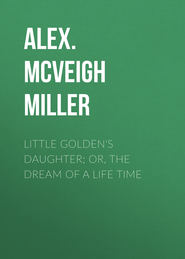По всем вопросам обращайтесь на: info@litportal.ru
(©) 2003-2024.
✖
Laurel Vane; or, The Girls' Conspiracy
Настройки чтения
Размер шрифта
Высота строк
Поля
"I can never wear them—do not ask me, Clarice," she said. "They make me feel like a traitor. It is enough that I have borrowed Miss Gordon's name. I cannot take the nice things they sent her, too. I should feel like a thief."
"La me! my dear, I never saw anybody equal to you for calling a spade a spade," cried pretty Clarice. "Now, I think you are too hard upon yourself, really! You will have to wear some of these pretty things to keep up appearances as Miss Gordon. The things you brought with you, and the few dresses Miss Beatrix spared you from her wardrobe are getting shabby, and I'm afraid these proud rich people here think that your pa dresses you too poorly for your station. Besides, this is September, and you cannot go on wearing muslins and cambrics and nuns'-veiling all winter."
"I will wear them as long as I can, at least," sighed Laurel. "Besides, Clarice, who can tell how soon our little comedy may be played out—how soon Miss Wentworth may be ready to confess her clever conspiracy?"
The quick-witted maid wondered a little at the note of vague regret in Laurel's tone. The day came when she understood.
The time to which they looked forward came sooner than they thought. In a week after the Gordons went South, a letter arrived for Laurel under cover of an envelope addressed to Clarice Wells. It was from Cyril Wentworth's fair young bride, who had been hidden away securely in Brooklyn all this time, her husband pursuing his daily occupation in New York, and returning in the evening to his sweet stolen bride, no one ever suspecting that the handsome young bachelor, whom the Gordons dreaded so much, had become a Benedick.
"My sweet little Laurel," wrote grateful, happy Beatrix—"the time of your long probation is at last over. My husband has at last been offered that lucrative business tour abroad, for which my father has been plotting so cleverly ever since he started me to Eden to hide me from my darling Cyril. It's a splendid chance for a young man in Cyril's position. It will insure us a competence, if not a fortune. Oh, Laurel, my heart is singing pæans of gladness over our happy prospects! I cannot be grateful enough to you for playing your part so well, until this happy conclusion! Only think, dear—in three days we sail for Europe. I shall need Clarice to go with me, and I want you to come, too, Laurel. Cyril is not rich, but we will care for you, my darling, and you shall be like my own little sister, until some fortunate man claims you for his lovely bride. You and Clarice must come at once, dear, as we have no time to lose, and Cyril has already taken our passages on the steamer. I sold my diamonds to pay for them, so you may know by that, little Laurel, how anxious I am to have you come. Do not delay. Invent some clever excuse for leaving, and come at once to my address in Brooklyn. You need not own up to our little conspiracy, dear. I know you would be too frightened. Leave that to me. When we are on the eve of starting, I will write to the Le Roys, and to papa and mamma, confessing all and imploring their forgiveness."
Clarice went almost wild over that letter. She was full of joy that the clever little conspiracy had worked out so successfully, and the promised tour to Europe was the realization of the dream of her life.
"I do not believe that we can invent any good excuse for leaving Eden," she said, thoughtfully. "They would not allow us. Mrs. Gordon's orders have been too strict. We must steal away to-night, Miss Vane, and we can telegraph them to-morrow to send our luggage. Do you not think that will be the better plan to get away?"
She looked at Laurel, who had never spoken one word yet. The girl was crouching in a low seat, like one overwhelmed with sudden grief. She lifted a white face full of desperate trouble, and somber, heavy, dark eyes up to Clarice.
"Oh, Clarice, do not ask me," she wailed. "I do not want to go! I cannot, I will not leave Eden."
And with that passionate denial, Laurel Vane's little feet turned aside into that luring path of sin whose roses hide so many cruel thorns.
CHAPTER XVII
"I do not want to leave Eden," repeated the dead author's daughter, passionately. "Do not ask me, Clarice! I will not go!"
Clarice Wells gazed at the pale face and somber dark eyes in alarm. Had this sudden good news turned the young lady's brain?
She went up to Laurel and shook her gently by the arm.
"Miss Vane, I do not think you understand," she said; "your probation here is over. We do not need to keep up this wretched farce any longer. Mr. Wentworth has secured his fine appointment abroad, and his wife wishes for us to go with her. Do you realize it, Miss Vane? To go abroad—to be like the sister of Mrs. Wentworth—is it not a glorious reward for the service you have done her?"
But Laurel, gazing drearily before her into vacancy, answered obstinately:
"I understand it all, Clarice, but I would rather stay at Eden."
"But why, miss?" asked the maid, astonished and half indignant.
Laurel, glancing up, saw the wonder in her eyes, and suddenly blushed a hot, burning crimson. The news had taken her by surprise, and she had spoken out unthinkingly. On being confronted with this very pertinent question from Clarice, she suddenly realized her error.
"But why, Miss Vane?" persisted Clarice. "Why should you wish to stay at Eden when you are in danger of detection every hour?"
"I love the place. I would rather risk detection than go away," faltered Laurel, miserably.
"Well, I am surprised," declared the maid, in genuine consternation. "I thought you were miserable here, and that you would rejoice to get away. I cannot see what has changed you so. It isn't possible, Miss Vane," a sudden suspicion darting into her mind, "that you have lost your heart to the master of Eden?"
Speechless and shame stricken, Laurel hid her hot face in her hands, and Clarice went on, admonishing:
"If you have, you had best come away with me and think no more of it, my dear young lady. Loving a man like Mr. Le Roy mostly means ruin and destruction to a poor girl like you. If you stay, they will be sure to find you out, and then what is to become of you? These proud Le Roys will be fit to kill you for deceiving them so. You had better go and fling yourself into the river yonder than waste your heart on Mr. St. Leon Le Roy."
Laurel sprung to her feet, her small hands clinched, her dark eyes suddenly blazing.
"Hush!" she cried. "How dare you accuse me of loving St. Leon Le Roy? It is false. I never dreamed of such a folly. I will not have you talk so to me, Clarice! Is there no reason I should want to stay but that I cared for him? Do I not love his grand, beautiful home? Do I not love the stately lady who has been so kind to me? I would rather be Mrs. Le Roy's servant than go away!" ended beautiful Laurel, wildly.
"She would not have you for her servant even, if once she found out the truth about you," argued sensible Clarice. "Miss Vane, I do not know what to think of this sudden fancy of yours. What would Miss Beatrix—I mean Mrs. Wentworth, say if she could hear you?"
"Clarice, I have served her ends and she can have no right to reproach me if I take my own way now," said the girl. "And indeed it is far better for me not to go. Mr. Wentworth is a poor man. Why should I burden him with my support? They will do better without me. Oh, Clarice, dear, kind Clarice," she flung herself suddenly on her knees before the perplexed maid and grasped her dress imploringly, "let me have my way in this! Go to Mrs. Wentworth and leave me here! Beg her not to betray the conspiracy yet. Tell her to be kind to me, to let me stay as long as I can before they find me out in my wickedness!"
"And then," said Clarice, gravely, "what will you do after that?"
"Then—the deluge," Laurel answered, recklessly.
They spent an hour in heated argument. Laurel was desperately resolved not to leave Eden, if possible. Her tears, her prayers, conquered Clarice's better judgment. The end of it all was, that Clarice gave in to her plans, and promised to influence Beatrix Wentworth to withhold her promised letters of confession to the Gordons and the Le Roys.
"La me! my dear, I never saw anybody equal to you for calling a spade a spade," cried pretty Clarice. "Now, I think you are too hard upon yourself, really! You will have to wear some of these pretty things to keep up appearances as Miss Gordon. The things you brought with you, and the few dresses Miss Beatrix spared you from her wardrobe are getting shabby, and I'm afraid these proud rich people here think that your pa dresses you too poorly for your station. Besides, this is September, and you cannot go on wearing muslins and cambrics and nuns'-veiling all winter."
"I will wear them as long as I can, at least," sighed Laurel. "Besides, Clarice, who can tell how soon our little comedy may be played out—how soon Miss Wentworth may be ready to confess her clever conspiracy?"
The quick-witted maid wondered a little at the note of vague regret in Laurel's tone. The day came when she understood.
The time to which they looked forward came sooner than they thought. In a week after the Gordons went South, a letter arrived for Laurel under cover of an envelope addressed to Clarice Wells. It was from Cyril Wentworth's fair young bride, who had been hidden away securely in Brooklyn all this time, her husband pursuing his daily occupation in New York, and returning in the evening to his sweet stolen bride, no one ever suspecting that the handsome young bachelor, whom the Gordons dreaded so much, had become a Benedick.
"My sweet little Laurel," wrote grateful, happy Beatrix—"the time of your long probation is at last over. My husband has at last been offered that lucrative business tour abroad, for which my father has been plotting so cleverly ever since he started me to Eden to hide me from my darling Cyril. It's a splendid chance for a young man in Cyril's position. It will insure us a competence, if not a fortune. Oh, Laurel, my heart is singing pæans of gladness over our happy prospects! I cannot be grateful enough to you for playing your part so well, until this happy conclusion! Only think, dear—in three days we sail for Europe. I shall need Clarice to go with me, and I want you to come, too, Laurel. Cyril is not rich, but we will care for you, my darling, and you shall be like my own little sister, until some fortunate man claims you for his lovely bride. You and Clarice must come at once, dear, as we have no time to lose, and Cyril has already taken our passages on the steamer. I sold my diamonds to pay for them, so you may know by that, little Laurel, how anxious I am to have you come. Do not delay. Invent some clever excuse for leaving, and come at once to my address in Brooklyn. You need not own up to our little conspiracy, dear. I know you would be too frightened. Leave that to me. When we are on the eve of starting, I will write to the Le Roys, and to papa and mamma, confessing all and imploring their forgiveness."
Clarice went almost wild over that letter. She was full of joy that the clever little conspiracy had worked out so successfully, and the promised tour to Europe was the realization of the dream of her life.
"I do not believe that we can invent any good excuse for leaving Eden," she said, thoughtfully. "They would not allow us. Mrs. Gordon's orders have been too strict. We must steal away to-night, Miss Vane, and we can telegraph them to-morrow to send our luggage. Do you not think that will be the better plan to get away?"
She looked at Laurel, who had never spoken one word yet. The girl was crouching in a low seat, like one overwhelmed with sudden grief. She lifted a white face full of desperate trouble, and somber, heavy, dark eyes up to Clarice.
"Oh, Clarice, do not ask me," she wailed. "I do not want to go! I cannot, I will not leave Eden."
And with that passionate denial, Laurel Vane's little feet turned aside into that luring path of sin whose roses hide so many cruel thorns.
CHAPTER XVII
"I do not want to leave Eden," repeated the dead author's daughter, passionately. "Do not ask me, Clarice! I will not go!"
Clarice Wells gazed at the pale face and somber dark eyes in alarm. Had this sudden good news turned the young lady's brain?
She went up to Laurel and shook her gently by the arm.
"Miss Vane, I do not think you understand," she said; "your probation here is over. We do not need to keep up this wretched farce any longer. Mr. Wentworth has secured his fine appointment abroad, and his wife wishes for us to go with her. Do you realize it, Miss Vane? To go abroad—to be like the sister of Mrs. Wentworth—is it not a glorious reward for the service you have done her?"
But Laurel, gazing drearily before her into vacancy, answered obstinately:
"I understand it all, Clarice, but I would rather stay at Eden."
"But why, miss?" asked the maid, astonished and half indignant.
Laurel, glancing up, saw the wonder in her eyes, and suddenly blushed a hot, burning crimson. The news had taken her by surprise, and she had spoken out unthinkingly. On being confronted with this very pertinent question from Clarice, she suddenly realized her error.
"But why, Miss Vane?" persisted Clarice. "Why should you wish to stay at Eden when you are in danger of detection every hour?"
"I love the place. I would rather risk detection than go away," faltered Laurel, miserably.
"Well, I am surprised," declared the maid, in genuine consternation. "I thought you were miserable here, and that you would rejoice to get away. I cannot see what has changed you so. It isn't possible, Miss Vane," a sudden suspicion darting into her mind, "that you have lost your heart to the master of Eden?"
Speechless and shame stricken, Laurel hid her hot face in her hands, and Clarice went on, admonishing:
"If you have, you had best come away with me and think no more of it, my dear young lady. Loving a man like Mr. Le Roy mostly means ruin and destruction to a poor girl like you. If you stay, they will be sure to find you out, and then what is to become of you? These proud Le Roys will be fit to kill you for deceiving them so. You had better go and fling yourself into the river yonder than waste your heart on Mr. St. Leon Le Roy."
Laurel sprung to her feet, her small hands clinched, her dark eyes suddenly blazing.
"Hush!" she cried. "How dare you accuse me of loving St. Leon Le Roy? It is false. I never dreamed of such a folly. I will not have you talk so to me, Clarice! Is there no reason I should want to stay but that I cared for him? Do I not love his grand, beautiful home? Do I not love the stately lady who has been so kind to me? I would rather be Mrs. Le Roy's servant than go away!" ended beautiful Laurel, wildly.
"She would not have you for her servant even, if once she found out the truth about you," argued sensible Clarice. "Miss Vane, I do not know what to think of this sudden fancy of yours. What would Miss Beatrix—I mean Mrs. Wentworth, say if she could hear you?"
"Clarice, I have served her ends and she can have no right to reproach me if I take my own way now," said the girl. "And indeed it is far better for me not to go. Mr. Wentworth is a poor man. Why should I burden him with my support? They will do better without me. Oh, Clarice, dear, kind Clarice," she flung herself suddenly on her knees before the perplexed maid and grasped her dress imploringly, "let me have my way in this! Go to Mrs. Wentworth and leave me here! Beg her not to betray the conspiracy yet. Tell her to be kind to me, to let me stay as long as I can before they find me out in my wickedness!"
"And then," said Clarice, gravely, "what will you do after that?"
"Then—the deluge," Laurel answered, recklessly.
They spent an hour in heated argument. Laurel was desperately resolved not to leave Eden, if possible. Her tears, her prayers, conquered Clarice's better judgment. The end of it all was, that Clarice gave in to her plans, and promised to influence Beatrix Wentworth to withhold her promised letters of confession to the Gordons and the Le Roys.











